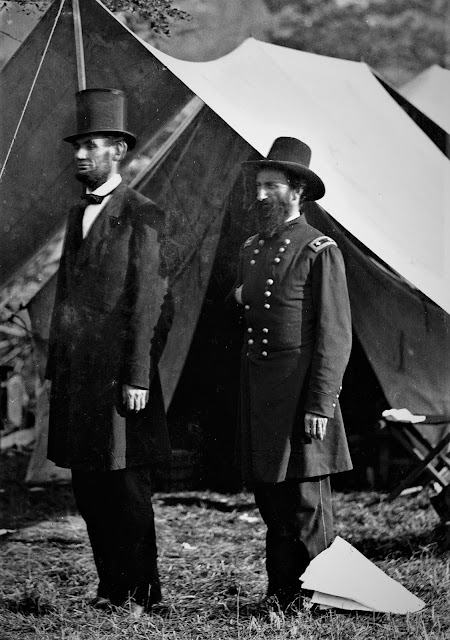In may ways McClernand (above, right) was Lincoln's (above, left) doppelganger. John was born in Kentucky - like Lincoln - raised in Illinois - like Lincoln - and a lawyer - like Lincoln. He was elected to the Illinois statehouse in Springfield - like Lincoln - and later was elected to the U.S. House of Representatives - like Lincoln. In November of 1842 John had married Sarah Dunlap, a BFF of Lincoln's wife, Mary Todd. Lincoln even tried his last court case in partnership with John McClernand. But unlike Lincoln, McClernand was a pro-union and anti-slavery Democrat, and as such, was politically valuable to the Republican President Lincoln.
In 1860 McClernand resigned from Congress and was commissioned a Brigadier General of Volunteers. In the snow at Fort Donelson, and under Grant, he allowed his command to be caught off guard by a rebel breakout attempt, in which his headquarters was captured. He then rallied his men and pushed the rebels back into the trap.
And then at Shiloh (again under Grant) he displayed fine skills
as a commander, reforming his men after the rebel dawn surprise attack (above), and on the second day, regained all the ground lost. But his most extraordinary campaign was the way he sceemed to replace his boss, General Grant.
McClernand (above, left) wrote frequent letters to his friend the President (above, right), making suggestions and offering opinions. This of course infuriated his fellow military officers who had to take orders from those same politicians but had no such back door access. As a Major General he even suggested himself as a replacement for Lieutenant General George McClellan, then commander of the Army of the Potomac. And he was insistent in telling Lincoln that Grant's plan to advance down the Mississippi Central Railroad would never capture Vicksburg.
McClerand knew his audience. Early in 1862 President Lincoln had pontificated at a gathering of naval officers, including Vice Admiral David Dixon Porter, who would have his own part to play in the coming drama on the Mississippi River.
"See… what a lot of land these fellows hold", said Lincoln, "of which Vicksburg is the key. Here is (the) Red River which will supply the Confederates with cattle and corn to feed their armies. There are the Arkansas and White Rivers, which can supply cattle and hogs by the thousand. From Vicksburg these supplies can be distributed by rail all over the Confederacy. Then there is the giant depot of supplies on the Yazoo. Let us get Vicksburg and all that country is ours. The war can never be brought to a close until that key is in our pocket. I am acquainted with that region...We may take all the northern ports of the Confederacy, and they can still defy us from Vicksburg. It means hog and hominy without limit, fresh troops from all the States of the far South, and a cotton country where they can raise the staple without interference."
So, on Thursday, 9 October 1862 , 48 year old Secretary of War Edwin McMasters Stanton (above) issued orders authorizing General of Volunteers John McClernand to raise a divisions each from Indiana, Illinois and Iowa - to be known as the XIII Corps - as an independent command to be used against Vicksburg from the Mississippi River side. And, at McClernand's suggestion, just what the recruits were to be used for was to be kept secret from the rest of the army and the political establishmennt.
Lincoln made it clear he desired McClernand's secret plan "...to be pushed forward with all possible dispatch..." But Stanton (above) included a catch in the orders. When Grant was present, McClernand would remain his subordinate. And Stanton made certain Grant was warned as to McClernand's secret appointment, and of his secret intentions toward Vicksburg.
McClernand (above) showed his ambition in the speed with which he raised and trained his men. His lead elements were dispatched to Memphis, Tennessee, arriving in early November of 1862 - within two months after his appointment.
As fast as McClernand and his lieutenants organized companies and regiments, and shipped them south to Cairo, Illinois (above), Halleck ordered them loaded onto steamboats and shipped south to Memphis, Tennessee. Once there they swelled the ranks of the Army of the Tennessee, commanded by General Grant - until McClernand physically arrived in the theater.
However, McClernand did not notice this purloining of his recriuts, as he was consumed with his approaching wedding . On the day after Christmas of 1862 McClerand married his second wife - 26 year old Minerva Dunlop - sister of his first wife. And then there was the honeymoon. All of which offered Grant a window of opportunity for action before his foe in blue, arrived.
- 30 -




.jpg)



.jpg)







































No comments:
Post a Comment
Please share your reaction.